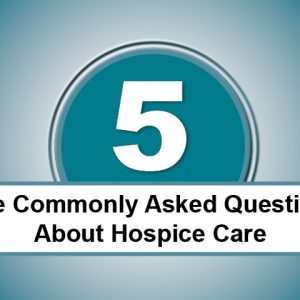Family members and caregivers often feel uncomfortable talking about death and dying. But, these may be some of the most important conversations we have. If we avoid talking about death, how will we know what our loved ones want?
It’s OK to talk about end-of-life wishes and hospice. Talking about hospice care does not mean there is nothing else that can be done. It also doesn’t mean there is no hope or death is coming soon.
It may actually be comforting to talk about end-of-life care options—which may include a wide array of topics from specific music to play at a funeral service to certain life-sustaining measures you do or do not want. These conversations may provide great grounding and solace for decisions that will inevitably have to be made as you and those you love face the end of life.
Many hospice professionals suggest a person think about hospice long before he or she faces a medical crisis. As you consider having a conversation about what you do or do not want at the end of life, consider who to speak with, when to have the conversation and how to broach the subject.
Who should you talk to?
The conversation about end-of-life care may begin with anyone. We recommend you talk with family members, your primary physician and hospice staff.
When should you start the conversation?
There are a number of events that can trigger a conversation about hospice care:
- When a loved one has been diagnosed with a terminal illness
- When a loved one has experienced repeated trips to the emergency room or hospitalizations
- When a loved one’s condition has steadily or significantly declined
- When a loved one is discouraged by, tired from or requests no further treatment
- When a physician suggests hospice care during a routine visit
How do you start the conversation?
As with any serious topic, beginning the conversation can be difficult, but creating an optimal time and place or looking for cues can ease the discussion.
Choose a private, relaxed time, free from distractions. Look for an opening; listen for comments about the condition, about giving up, being tired of trips to the hospital, or just wanting to be comfortable. A natural time when families tend to gather are during the holidays; embrace your discomfort and start the conversation.
Try these conversation starters:
- “That last hospital stay seemed hard on you. I think there’s a way we can avoid future hospitalizations.”
- “We can manage your care right here, at home.”
- “You don’t have to be in pain anymore; Hospice can help. They’re experts in pain management and caring for people with this illness.”
- “Lately, you seem to be struggling more with breathing, walking and eating.”
- “I’d like to call Hospice for you so we can see how they might be able to help to you.”
If there is resistance, accept and don’t judge. Don’t push. Wait for another time. Your opinions and wishes may be different than your loved one, family members and friends.
Talking about hospice doesn’t have to be difficult. Conversations about death and end-of-life aren’t necessarily easy to have, but they are critical to the well-being of those we love. Finding a way around the awkward talk may bring great comfort to those left behind.
For more information about hospice, visit our website or call (800) 237-4629.
About Hospice of the Red River Valley
In 1981, Hospice of the Red River Valley was founded on the belief that everyone deserves access to high-quality end-of-life care. We fulfill our nonprofit mission by providing medical, emotional, personal and spiritual care, as well as grief support to our patients, their families and caregivers during a tender time in life. Our staff helps those we serve experience more meaningful moments through exceptional hospice care, 24 hours a day, 365 days a year, wherever a patient calls home. The organization serves more than 40,000 square miles in North Dakota and Minnesota, including in and around Bismarck, Detroit Lakes, Devils Lake, Fargo, Fergus Falls, Grand Forks, Lisbon, Thief River Falls, Valley City and many more communities. Hospice of the Red River Valley offers round-the-clock availability via phone, prompt response times and same-day admissions, including evenings, weekends and holidays. Contact us anytime at 800-237-4629 or hrrv.org.




